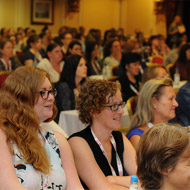
ISFM Congress 2017 attracts more than 900 delegates
Organisers of the ISFM (International Society of Feline Medicine Congress) 2017 say they were ‘overwhelmed’ by the response to the nursing stream, which attracted some 250 delegates over the course of the two days.
The ISFM nursing programme was initially designed to take place at The Grand Hotel in Brighton. However, interest was so high that a neighbouring hotel was secured to take a greater number of nurses.
Sam Taylor, director of ISFM’s nursing distance courses, who chaired much of the meeting, commented: “We have been overwhelmed by the response and although we will not always be able to have a nursing stream at Congress we will certainly ensure that we run ISFM events for nurses in 2018, so watch this space!”
Some 600 vets and 350 nurses from across the world attended this year’s ISFM Wold Feline Veterinary Congress.
Over the course of five days (28 June - 2 July), delegates attended more than 28 hours of CPD and were treated to a host of well-respected speakers and feline experts. This year's line-up included Dr Mark Peterson and Prof Claudia Reusch leading on endocrinology, and Kieran Borgeat and Prof Virginia Luis Fuentes presenting the latest findings in cardiology.
A busy commercial exhibition runs alongside the programme and delegates could visit a poster room showcasing the latest in veterinary research, case series and case series reports. The social events were also well received, including cocktails and canapés on the first evening and fish and chips on Brighton’s famous pier.
Next year’s congress takes place in the city of Sorrento, Italy, on the beautiful Amalfi coast. Held 28th June to 1st July, the Congress will cover feline urology and feline oncology. Full details of the Congress are yet to be published.
Image (C) International Cat Care.



 The Veterinary Medicines Directorate (VMD) is inviting applications from veterinary students to attend a one-week extramural studies (EMS) placement in July 2026.
The Veterinary Medicines Directorate (VMD) is inviting applications from veterinary students to attend a one-week extramural studies (EMS) placement in July 2026.